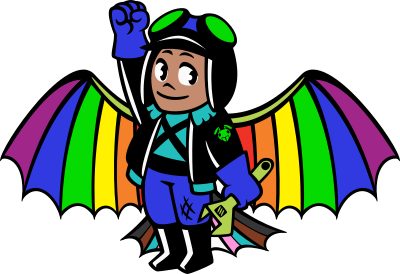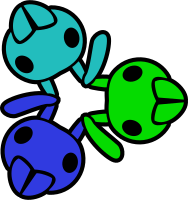Healthy Collective Decisions Across Computers

We’re passionate about democratizing and redecentralizing decisions. Learn more about our values here.
Our product, Bivouac Wiki, is open source software built to achieve that mission.
It’s a sandbox for building ethical online governance, sharing choices and delegating responsibilities.
Whether it’s a simple survey, electing representatives to a union, or making direct choices as a group, Ornithopter’s there to help you make a decision with Bivouac Wiki.
How Ornithopter Hosting Helps
We provide managed Bivouac Wiki hosting tailored to groups big and small. Visit app.ornithopter.me for a free test flight!
This software is made for online governance (where a paper vote is costly). Paper is still awesome. Healthier voting starts with multi-member districts and some form of approval/rated/ranked voting.
Online governance also affords other kinds of digital-only features. These include things like federation (e.g. Mastodon), liquid democracy (temporary delegation), and configurable decisions. Meaning comes from your friends (petnames and web-of-trust, more on that later).
What is Bivouac Wiki?

Healthy
Group
Decisions
Across
Computers
A bivouac is a mobile nest made of the ants themselves. Some ant species have multiple queens in a nest. Some hive organisms pick new locations as a team (honeybee swarming/waggle dance).
Bivouac Wiki is open source software that embodies collaborative group structure and decisions. You use it to define how your group governance works, and enable online participation (or delegating representation).
You can read more about the features here.
Bivouac is a new project, and we’re happy to hear about the features your deliberative body wants to try out!
How Does This Change Governance?
- Sincere Favorites: A change of voting methods changes the physics of the group!
- Delegation & Federation: A change of how the protocol works changes how collaboration works!
(if you’re a voting nerd you’ll know that it mathematically gets complicated (here’s a comparison) as to the trade-offs of different systems for single-winner and multi-winner votes. Really the point is it’d be better if things weren’t FPTP. Bivouac lets you choose which counting method is best for your org - we’re fans of approval (pick multiple) and rated voting)
1. Sincere Favorites
It really sucks when your favorite choice isn’t likely to win, but the system only lets you pick one (“strategic voting”). “You can only vote for one, & there’s only one winner” leads to two entrenched parties (Duverger’s law). Neither of which is who you’d actually want, because voting for your true party would sabotage the closest second.
Example: population votes for 30% short haired cats, 30% fluffy cats, & 40% golden retrievers.
- old - FPTP: would pick golden retrievers (not representing 60% of people)
- new - approval, rated, or ranked might pick one of the two cat options.
This happens because either of the cat votes “spoils” the other one, even though they have more in common.
Another: population of 60% cat lovers, & 40% dog lovers.
- old: single member districts, 100% cat senate (not representing 40% of people)
- new: 3 representative district, 66% cat, 33% dog
This happens because of single-member districts instead of multi-member districts. The more reps per district, the more accurate the fraction of the elected body vs the surveyed population. It’s a trade-off between reps nearby and reps that share your values.
Voting and representation can be different, and there are ways to make it different. Use Ornithopter to showcase governance decisions in a healthy way!
This allows for:
- legitimate third parties (without sabotaging similar opinions)
- cooler temperatures (not a cutthroat primary)
- better representation (of smaller groups)
Why be stuck picking between a Manticore and Chimera, when our ideas are so diverse?

Artwork by L James
Imagine where multiple similar competing parties and ideas can thrive and evolve.
2. Federation & Delegation
Federation provides for similar quirks, as does bivouac’s petname and delegation system.
For example:
- collaborating across domains
- moderating across domains
- cross-org collaboration
Federation (in the fediverse, like on Mastodon or other ActivityPub software) is a place in-between a very big site (like Facebook) and a very small site (like a personal blog). Federated sites can talk to each other (or not) as one big network. Your “home server” has admins and moderators you can get to know, where Facebook’s moderation is hidden away.
Liquid Democracy (temporary delegation) is another way that computers can make decision making different. You can delegate most decisions on a topic to a particular person, delegate others to someone else, and maybe vote directly on some.
Many gross online pyramid schemes focus on having “the one, the only, true name” of a thing. Like squatting and hoarding, rent seeking and speculating. In the physical world, maybe there can be only one, but on the digital world, there can be many. Petnames are an example of going against the cryptobro grain, and removing that incentive. Physical choices do eventually have to resolve to finite amounts, but online groups can split and merge as they see fit.
Petnames are a solution to a digital problem about uniqueness and memorizability of handles. Bivouac supports a mode of identity that derives meaning from your graph of friends. You can also bridge it to the fediverse and derive meaning from that network.
But wait, this is software, not paper?
And it isn’t blockchain, either.
This software focuses on being the opposite of many “web3” anti-values.
- Not a coin. You make decisions, not fictional money.
- No more compute than necessary.
- Humans still fix things when it’s broken.
- Respectful and non-permanent.
This enables:
- per-community norms, rules, & reputation
- spend less time online (via liquid democracy & delegation)
- staying connected with friend-based identity graphs
Bivouac is a software for exploring things not commonly seen in apps. Even open source ones that escape the walled garden can sometimes fall back to landlord-ish tendencies. Define your community, and set up how it interacts with others!